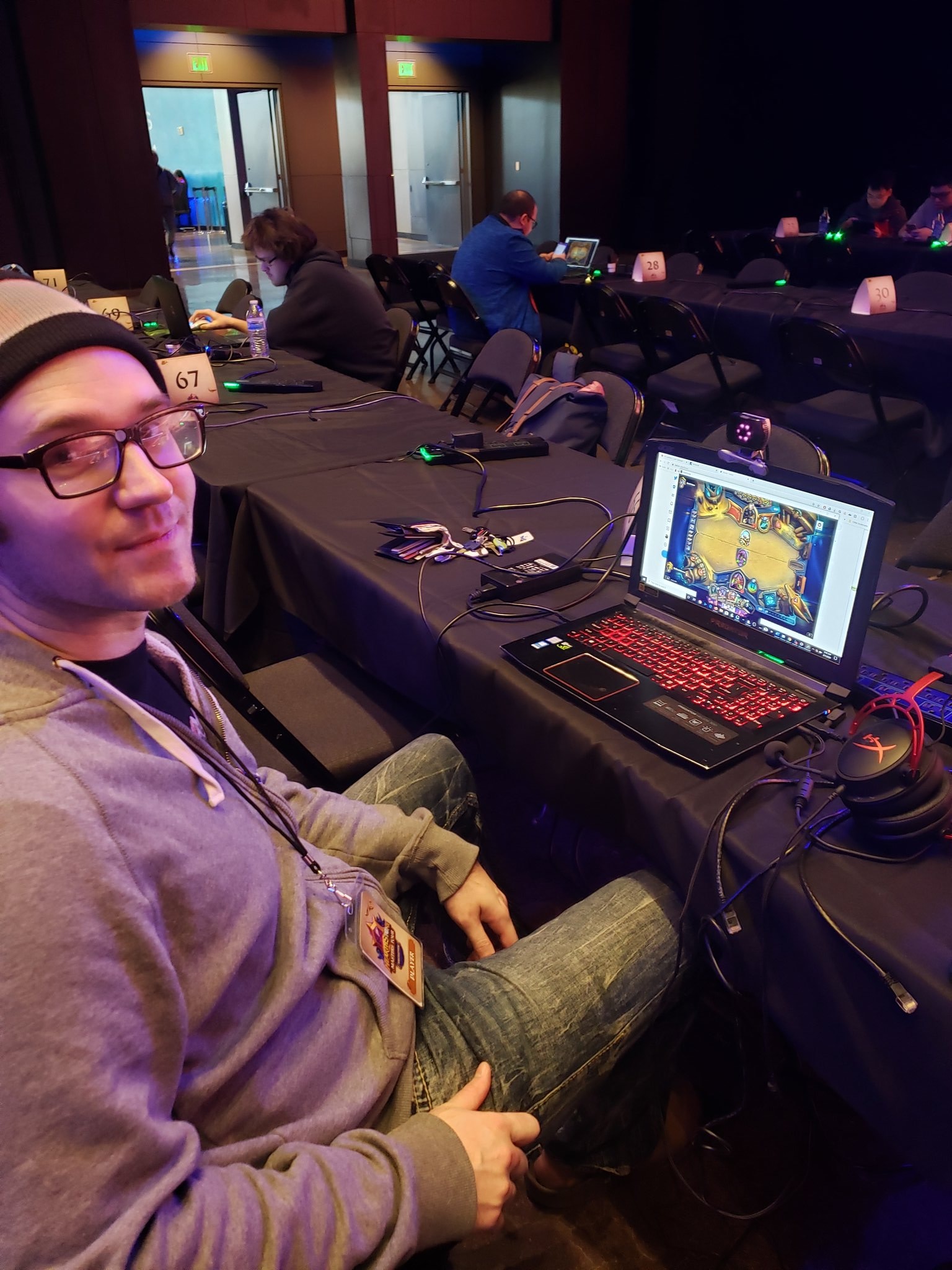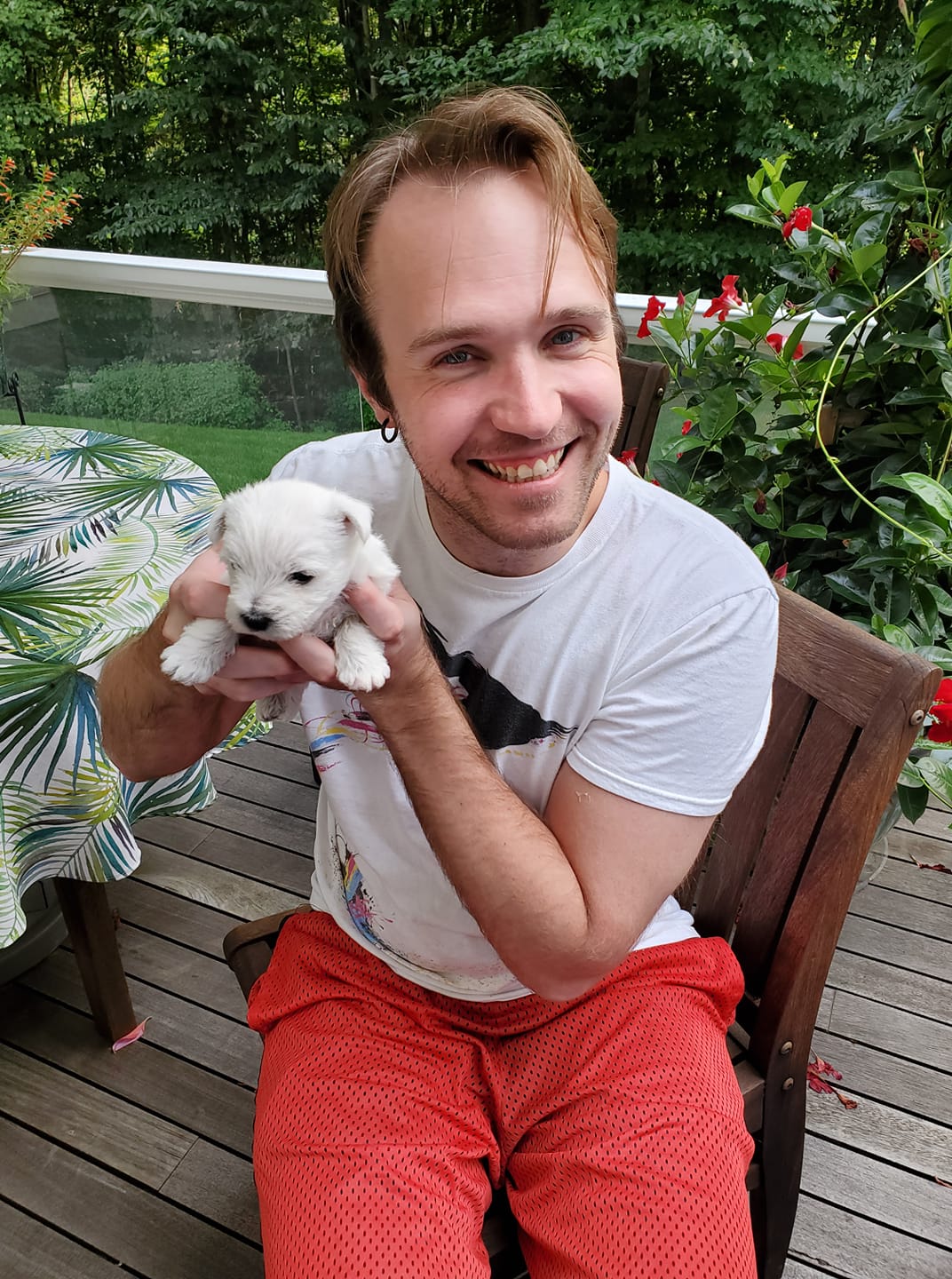Tavern Talks: NoHandsGamer
Gather ‘round and listen in, it’s time for Tavern Talks, the series that highlights some of the amazing members of our fine tavern!
Luke “NoHandsGamer” Kooken is the talented Americas Grandmaster known for playing Hearthstone without using his hands. Here, he talks about how mindset is so important for living with his disability, and for thriving at the top level of competition. So, pull up a chair, it’s time for Tavern Talks!
The following interview has been edited for readability.

Q: Tell us about yourself and how you got into Hearthstone.
A: I have a chronic pain disability, which started in around 2009. In 2016, my pain levels flared up substantially. I started having trouble with the controls for other games, so my brother introduced me to Hearthstone. I have a background in card games and the U.I. was easy to operate with my disability equipment. As I started to get good, I started grinding ladder and competing in tournaments on Battlefy. Then, once I started performing well, people suggested that I stream. That’s how it all started.
Q: Hearthstone was compatible with a setup you already had at that time?
A: Yeah, before I was a Hearthstone pro, I worked in insurance for 10 years. I couldn’t work without my hands, so I went to the disability counselors at my college and one thing they recommended was a voice-to-text program.
I also used an infrared camera, which people who have seen me play are more likely to have seen, since I don’t use the voice-to-text for Hearthstone. The camera measures light that reflects off a sticker I put on my glasses, which lets me use small head motions to control my mouse.
Q: How did you adapt that setup for Hearthstone?
A: There were certain adjustments that I’ve had to make. I have a foot pedal now that I didn’t have for my first few years of playing Hearthstone because it would hurt too much to use it all day. Before, I used dwell clicking, meaning I would hold my mouse in place for a moment for it to register a click. That would give me trouble on turns where there were a lot of actions. It was even worse in high-pressure games, because your body’s full of adrenaline, which can make it hard to hold still long enough for the click to register.
The foot pedal increases my APM (“Actions Per Minute”) by like 200%. If you watch me, you’ll see that I actually usually make my plays very quickly. I’d estimate that I’m faster than around 80% of Hearthstone players because I make my decisions faster, and most of APM is decision-making. I’m sure you’ve seen lots of people without hand problems who sometimes rope, make mistakes, and run out of time; nobody’s immune to that. But the fact that I have a physical disadvantage there has made me more aware of it. I don’t like waiting until the end of my turn to start taking actions because I know I might not finish in time. A lot of time when you see me roping during a turn, I will have already taken my actions for the turn and I’m thinking about making a big play next turn.
Q: You mentioned things got better recently?
A: I started to figure some stuff out in around 2017-2018. I was doing tons of yoga at the time, because yoga was one of the physical activities that I could do. I’m a very energetic person, so when I found something I could do that wasn’t stopped by my pain, I became obsessed. I would go to a yoga class and then come home and do more yoga. But I over-did it and one day my back started hurting like crazy.
I got it under control, but then a week before Hearthstone Championship Tour: Philadelphia my back started hurting to the point where it was debilitating. I went to my chiropractor and asked why my back hurt while I was playing Hearthstone, but not at work and he said maybe it was just pressure. Hearthstone’s really important to me, involves stressful turns, and can have a lot more at stake at any given moment, both fiscally and emotionally, especially in a tournament.
I took a break for the rest of the week, submitted decks that I was already comfortable with, and ended up winning the whole thing! That tournament was the first big tournament that I won, and it’s where a lot of people learned who I was.
Then, a week later, the back pain returned. It was heartbreaking and frustrating, because I felt like I was finally doing something well, and then some pain comes and stops me. I was scared that I was going to have to quit Hearthstone, and maybe quit my job. It felt like it was the last straw, like my pain had gotten so bad that I couldn’t beat it.
I started doing some research and I found this one book called “Healing Back Pain.” The basic idea of that book is that there’s nothing physically wrong with your back, you’re just under a lot of stress and your body is reacting to that stress by causing back pain. I can’t speak for everyone with pain issues, but this resonated with me, because I had been to so many doctors who always told me they couldn’t find anything physically wrong with me.
So I treated my back pain with things like therapy, journaling, and self-reflection and, within two months, my back pain had completely gone away! That was a miracle to me. Over time, my hand and foot pain went down somewhat, too, and now I can type in moderation, use my foot pedal, and do other activities I couldn’t do before.
There’s this concept called the 80-20 rule, where if I can do 20% of the activity, I can get 80% of the benefit. Typing in moderation has been a huge quality of life improvement. Having my hands for a little bit lets me do my own Twitch and Youtube stuff. It was tough earlier on, for instance, when I was streaming and somebody would ask me for something simple, and it would hurt just to type “!deck” for them. The added productivity that I’ve gotten in making content, even if it’s not at a maximum, has been so helpful in running my own business.
Q: How has that changed your mental game?
A: A really common thing for Hearthstone players is that you’ll be doing really well, and then you hit a rough spot and you’ll think, “Ah! I suck at Hearthstone!” I’ll make statements to myself like, “Everybody has ups and downs in their Hearthstone game, and the meta is constantly changing, so this is something that everybody struggles with.” As long as I know I’ve done the work and am focusing, that helps me ease my anxiety and feel more confident.
It’s about doing everything in your power. Then you go with it and let the chips fall where they may, and if they don’t go your way this time, they will the next time, or the time after that. If you’re really on top of your game, working hard, adapting, and keeping good habits, then things will go right for you eventually. It’s really hard to consistently do all those things, but, if you are, then given enough time, things will go right.

Q: Earlier in your career as a Grandmaster, you expressed some doubt about competing at that level. Over the last couple seasons, you’ve become one of the best performing Americas Grandmasters. Was that mindset correcting what helped you get there?
A: Yeah, part of the reason that I was hard on myself was because I knew I fell short of my own standards. I’ve had points in my life where I knew that I needed to rest, but I didn’t, and because of that, I was in pain for a year. So now I’m very cognizant of my mistakes.
When I posted that, I didn’t want people to think I was just unlucky. People were sending me encouraging words after that season, but I knew that if I kept up the habits I had during that season, I wouldn’t survive unless I got lucky. It’s nice to say, “I know you’ll do great,” but I’m playing under massive stress, against 15 high-level players, who are all trying to do well. There are just no guarantees there. This is a zero-sum game: some people are going to win and some people are going to get eliminated from this thing we’re doing professionally.
This most recent season, I knew that I didn’t make those same mistakes. I changed a bunch of my habits, I streamed less and focused on mastering my decks, I timed my caffeine consumption before my matches, and I took up breathing exercises and other habits to help get my brain in the zone. So even though I didn’t win it all, I knew I did just about everything in my power to give myself the best chance to win. I was proud of how I did, and I was happy to get that support because I felt I deserved it.
Q: What is your approach as a coach, and what can players do if they want to improve?
A: When I coach people, I look at their plays and I can usually find a pattern of mistakes. We’re often unaware of our mistakes, because if we were aware of them, we would just fix them. If you can’t hire a coach, you can review your replays or have a friend look over your plays and can sometimes catch things.
There are two ends to learning: there’s learning new ideas to incorporate into your game, and then there’s mastering what you know. I coach that way, too: I’ll teach them some new stuff, and then we’ll go over the stuff we learned the week before.
The more things that are worked in and mastered at an unconscious level, the more mental energy you have to learn and execute more advanced things. Some people think that to learn advanced things they need to do all this high-level thinking, but sometimes if you just master what you know, and start paying attention, your brain will just find things that it didn’t find before. Especially under pressure, the more you’ve mastered, the more you trust your plays and the more you are able to spot opportunities to take a less common line.
Q: What would you say in terms of making the community more inviting to disabled people?
A: It’s a weird question for me, because people have been very inviting of me in Hearthstone—both Blizzard and people in the community. I certainly can’t speak for everyone, because each disabled person has different needs, but for me there’s always that fear that I’ll go to an event and they tell me that I have to use their equipment instead of my own. Now that I’m known in the community, I’m confident that won’t happen, but that’s the type of thing that scares me in life.
I can usually handle my own problems. All I need is for people to be empathetic and accommodating. I think for most people who aren’t early in their disability, they have figured out how to get around, and how to live their life—they’ve gone through that stage, I know I have. When people say, “Oh, well can’t you just…” The answer is, “No, no I can’t.”
But, like I said, people have been very accommodating with Hearthstone, and I am grateful for that!
You can see more of NoHandsGamer on Twitch, Youtube, and in Season 2 of Hearthstone Grandmasters, starting on August 13! You can also follow him on Twitter for updates and to contact him for coaching.

